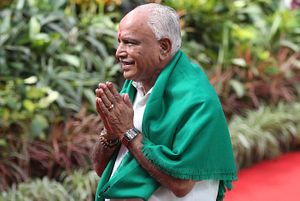Following a high-stakes and, at times, ugly campaign between the Bharatiya Janata Party (BJP), the Indian National Congress (INC), and the Janata Dal (Secular) (JDS) in Karnataka state assembly elections, the action is far from over. B.S. Yeddyurappa of the BJP has been sworn in as chief minister, but has 15 days to prove a majority and form the government. Elected MLAs from the INC and JDS were reportedly transported out of the state on buses in an attempt to prevent defections to the BJP.
Whichever party forms the government, the Karnataka election has significant implications for the BJP and the opposition parties as they look toward the general election in 2019. While the BJP’s strong showing in the state bodes well for the party, pre-election alliances between opposition parties, although highly complex and difficult to achieve, could be change the scenario all together.
Post-Election Drama
As the results of the elections rolled in on May 15, the BJP emerged as the single largest party with 104 seats, but is short of an outright majority. Meanwhile, Congress, which has 78 seats, offered its open and unconditional support to the JDS, with 38 seats, to try and form the government. The INC-JDS coalition, along with the Bahujan Samaj Party and two independents, have the support of 117 MLAs, well over the majority mark of 112.
Both the BJP and the INC approached the Vajubhai Vala, the governor of Karnataka, to stake a claim to form the government. The governor offered the BJP, as the largest party, the first chance; the INC and JDS protested, arguing that given they had struck an alliance and could prove they had a clear majority, they should be invited to form the government instead. The drama culminated on the night of May 16, when the INC-JDS coalition approached the Supreme Court of India in an attempt to block the swearing in of B.S. Yeddyurappa.
The Supreme Court refused the block the swearing-in, but the swearing-in and the formation of government would be subject to the final outcome of the case filed the INC and JDS. Although the verdict was favorable for the BJP, the test for the party will come over the next few days as the party tries to prove a majority.
The INC and JDS have taken extreme steps to prevent any MLAs from going over to the BJP, including busing them out of state. Yet, reports indicate at least two or three MLAs were not part of the group that was transported out of Karnataka, and could be at risk for defection. The leader of the JDS, H.D. Kumaraswamy, has also alleged that the BJP had made overtures to JDS MLAs, offering bribes of 1 billion Indian rupees ($14 million) and cabinet positions in exchange for support. The BJP has vehemently denied this charge.
Looking Toward 2019
While the drama ensues in Karnataka, both parties can use the results to claim a victory in the state as they look toward the 2019 general elections. As Gilles Verniers, Assistant Professor of Political Science and Co-Director of the Trivedi Centre of Political Data at Ashoka University, stated, “The BJP has emerged as the largest party in terms of seats… The BJP certainly did produce the most impressive performance, both in terms of progression in votes and geographical presence.” Meanwhile, Congress beat out in the BJP in terms of vote share, and “can compensate for its poorer seat performance by stitching a post-electoral alliance with the Janata Dal (Secular).”
The results in Karnataka reinforce how the BJP has become the dominant political force in India under Prime Minister Narendra Modi and Party President Amit Shah. For the BJP, which was previously only competitive in northern India, to emerge as the largest party in Karnataka is a serious feat. The BJP has expanded well beyond its traditional base of support since Modi came to power; the party and its allies now control 21 of India’s 29 states. These state assembly victories provide the party with significant momentum as it gears up for 2019.
However, considering the trends from Karnataka, as well as previous elections since 2014, it is also clear that alliances will be crucial for the INC as it looks toward the 2019 elections. A number of analysts and politicians have commented that the Congress party may have been better off in Karnataka if it had negotiated a pre-poll alliance with the JDS, as when it successfully allied with Janata Dal (United) and the Rashtriya Janata Dal (RJD) and blocked the BJP from coming into power in Bihar in 2015. When coupled with the Samajwadi Party-Bahujan Samaj Party alliance in Uttar Pradesh that defeated the BJP in the 2018 Lok Sabha by-polls, the idea of an alliance of opposition parties going into 2019 could be a game-changer.
For now, however, the parties will still be locking horns in Karnataka, as the BJP tries to prove its majority while the INC and JDS try to maintain their alliance. Whatever the result of the power jockeying in Bengaluru, the reverberations of this election have already been felt across India’s political class as the battle for 2019 continues to heat up.

































